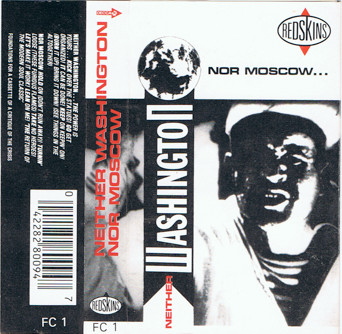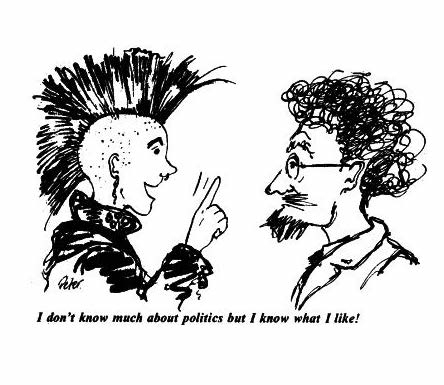Rock against capitalism
A history of the British punk band Redskins

A note on language: As the article points out, the band chose its name to indicate that they were left-wing skinheads as opposed to Nazi skinheads, in other words, “red” skinheads.
I first encountered the Redskins in the pages of the book 33 Revolutions Per Minute, in which the author dismissed the band as “hectoring, hairshirt protest-pop.”1 This was not exactly the most ringing endorsement, but my interest was piqued and I sought out the music of this revolutionary socialist band and their mixture of two-tone ska and soul. Their only album, Neither Washington Nor Moscow, just received a deluxe reissue last January, so now is the perfect time to remind Americans of the band that, in one reviewer’s words, wanted to “walk like the Clash and sing like the Supremes.”

The Redskins began as a punk foursome known as No Swastikas in 1978, consisting of Chris Dean (guitar and vocals), Martin Hewes (bass), and “two anarchists.” After the anarchists left, Nick King joined on drums. The band’s formation was inspired by the Rock Against Racism movement, but the name caused problems.
Some thought that the band were fascists, a misconception heightened when venues and publications misnamed them “Swastikas.” Throughout this time, Dean was involved in anti-racist struggles and unemployed marches. The band rechristened themselves Redskins, reflecting their status as left-wing skinheads. Their first single “Lev Bronstein” (the birth name of Leon Trotsky), backed with “Peasant Army,” was released on the independent CNT record label and gave little indication of the band’s promise. “Lev Bronstein” sounds like second rate post-punk, while “Peasant Army” is nondescript punk. Dean later said of the single, “It was a disaster really.” Chris admitted that it was “not accessible, not a good production.”2
However, the group improved greatly after that inauspicious debut. Their next single, also released on CNT, “Lean On Me,” was listed as one of NME’s Tracks of the Year for 1983. The band did an interview for Sounds after the single’s release, in which Chris Dean said,
Political bands are a dirty word since the arse end of RAR [Rock Against Racism], but that’s because they missed the point of what makes great music. … Take the Gang Of Four, ideologically they might have been perfect, but who the fuck was listening? “A Town Called Malice,” “Ghost Town,” “The Lunatics Have Taken Over The Asylum”—they were all great because they were popular and they had something to say.3
Dean also took time to dispel misconceptions about the skinhead subculture, namely that all skinheads were far right or pro-fascist. The interview concluded with Dean saying,
You can do more than just do benefits – music can uplift working class kids and it can change attitudes. A band can act as a catalyst. A record is a weapon with a worker at both ends. Working class kids are buying it. No-one would be interested in Paul Weller if he wasn’t in a band. Being a pop star gives you access to millions of people. From the moment you’re born, you’re told what to do. But rock’n’roll gave kids a voice. Working class kids were suddenly being listened to – by other working class kids.4
After the release of “Lean on Me,” the Redskins signed to the major label London Records. Hewes had previously defended the idea of bands signing to a major label in a letter to the Socialist Review, writing, “Money does not necessarily distort consciousness, it depends on how you earn it.” This label change did nothing to deflect from the group’s politics, either in their music or outside it. The Redskins performed at a free “Jobs For a Change” concert on June 10, 1984 organized by the Greater London Council to protest unemployment and Thatcher’s budget cuts, alongside the Smiths and Billy Bragg. During the Redskins’ set, the band and their fans were attacked by Neo-Nazi skinheads. Fortunately, the fascists were driven off by union mineworkers and members of the left-wing group Red Action.
The Redskins threw themselves wholeheartedly into supporting the National Union of Mineworkers’ strike against prime minister Margaret Thatcher’s pit closures through music and benefit shows. Their single “Keep On Keepin’ On,” which reached number 43 on the U.K. charts, was an anthem for the strikers with lyrics like, “If it takes a year we got to last a year.”
Chris Dean met and became friends with a striking coal miner with the oddly appropriate name of Norman Strike. When the band performed on the television program The Tube on November 9, 1984, Strike attempted to give a speech during “Keep On Keeping On,” but the microphone audio was cut off. This led to allegations of censorship against The Tube. Strike’s speech, inaudible to the television audience, concluded, “Miners’ support groups have sprung up all over the country. They’re supporting us. You should be supporting them.”
In a 1985 Socialist Review interview, Dean claimed, “Something like the miner’s strike is perfect for the agitprop element of rock and roll” due to the scale of the strike. If people think that we’re ramming it down their throats, then that’s tough shit.” Bassist Martin Hewes told NME during the strike. “If you get too subtle, no one knows what you’re on about.”5
The band released two other singles in 1985. First came “Bring It Down (This Insane Thing),” a soulful attack on the capitalist system with lyrics about the insanity and inhumanity of the profit motive. It charted even higher than “Keep On Keeping On” at number 33. The release of their next single was more of a headache for the group. When Decca balked at releasing “Kick Over the Statues” as a benefit single for the anti-apartheid movement, the band did it anyway through an independent label. All royalties went to the Federation of South African Trade Unionists and the African National Congress. Lyrics like “The first act of freedom/All over the world/Is to topple the statues/Kick the bosses over” resonate strongly even today in the United States, given recent movements to tear down statues of Confederates and slaveholders.
After the defeat of the miners’ strike, many of the U.K.’s left-leaning musicians joined an effort called Red Wedge to rally support for the Labour Party in the next election to oust Thatcher. Those involved included the Style Council, the Communards, Billy Bragg, The The, and many more. Absent were the Redskins, who decried the rightward drift of the Labour Party and the centrism of its leader, Neil Kinnock. The Redskins’ decision not to participate in Red Wedge was debated in the pages of the Socialist Review. An article by Julie Waterson, “Rocking For Kinnock,” thought the band should join the effort, while nonparticipation was defended in a letter by Noel Halifax.
British music magazine Melody Maker held a debate on the pros and cons of Red Wedge. On the pro side were Bragg, Paul Weller of the Style Council, Jerry Dammers of the Specials, and Labour MP Clare Short. On the con side were Conservative MP Greg Knight, the Police’s drummer Stewart Copeland, and … Chris Dean of the Redskins. While Knight and Copeland assailed Red Wedge from the political right, Dean joked about forming “Redder Wedge” and derided the enterprise as a “tidy way to sell out socialist principles in favor of electoral success for Kinnock.” 6
The Redskins had long had a contentious relationship with Billy Bragg over political differences. Chris Dean had actually given Bragg one of his first positive write-ups as an NME writer in 1983.7 Bragg recalled that when he shared a bill with the Redskins, “All the while I was playing, the Redskins were putting anti-Labour announcements above my head, which I thought was a bit out of order frankly.”8 For their part, the Redskins called Bragg “Neil Kinnock’s publicity officer” while covering one of his songs live.
Shortly after the debate on Red Wedge, the Redskins sole album Neither Washington Nor Moscow was released. The album peaked at 31 on the British charts and was supported by the singles “The Power is Yours,” a declaration of working people’s power, and “It Can Be Done,” a historical overview of revolutionary socialism. The music was also interspersed with snippets of talks given by the Socialist Workers Party’s intellectual leader Tony Cliff. However, the triumph of this album presaged the beginning of the end of the band.

That summer, the band toured Europe, including stadium shows in France, Italy, and Germany. They had a two-hundred-thousand-member audience in Paris. But internally, tensions were starting to arise between Chris Dean and Martin Hewes. Additionally, the defeat of the miners’ strike was as demoralizing to the band as it was to the broader Left.
Why the band broke up has been shrouded in mystery. Punk poet Attila the Stockbroker claimed the decision to disband came directly from SWP leader Tony Cliff, “because what they were doing wasn’t as important as directly contacting the organized working class” by selling copies of the Socialist Worker at plant gates.9 In a 2003 interview, Hewes claimed he left because the group was “becoming a contradiction” because of its involvement with a major record label.
When the Redskins did break up, Billy Bragg claimed with some satisfaction that, “When the Redskins split up they had to write a mea culpa in the Socialist Worker about how they’d been deluded to think that pop music and capitalism could work together.”10 The Socialist Worker did indeed run an article titled “A Rock And Roll Socialist Fantasy Ends” after the band’s breakup, in which Martin Hewes bemoaned, “It’s hard to get up for a paper sale when you got back from Bradford at five in the morning.”11 Afterwards, Hewes briefly played for the Jesus and Mary Chain before working as a music teacher, while Dean dropped out of the public eye after attending a march to mark the ten-year anniversary of the police killing of anti-fascist activist Blair Peach.
In the United States, the Redskins are much more obscure today than in the United Kingdom. The band never toured the U.S., and yet their influence somehow permeated punk culture. For example, Minneapolis anti-fascist skinheads in the 1980s took influence from the group’s music and political lyrics.
Part of the purpose of this article is to introduce readers to the band and encourage them to seek out their music. Readers with a library that has a subscription to Freegal can download their first few singles off the compilation album Epilogue and see for themselves what the fuss was about.
There’s an anecdote from Redskins history that I feel best sums up the ethos of the group: NME assistant editor Karen Walter saw coworker Chris Dean buy
a pair of new Lonsdale boots round the corner from Carnaby Street, and I said, “You’re a member of the Socialist Workers Party: how do you justify that amount on a pair of boots?” He said, “Karen, we’re not against people buying Chanel coats; we just think everybody should be able to afford to buy Chanel coats.”12
Featured image credit: Robert Thivierge via Wikimedia Commons; modified by Tempest.
Categories
We want to hear what you think. Contact us at editors@tempestmag.org. And if you've enjoyed what you've read, please consider donating to support our work:
DonateHank Kennedy View All
Hank Kennedy is a Detroit area socialist, educator, and longtime comic book fan.
